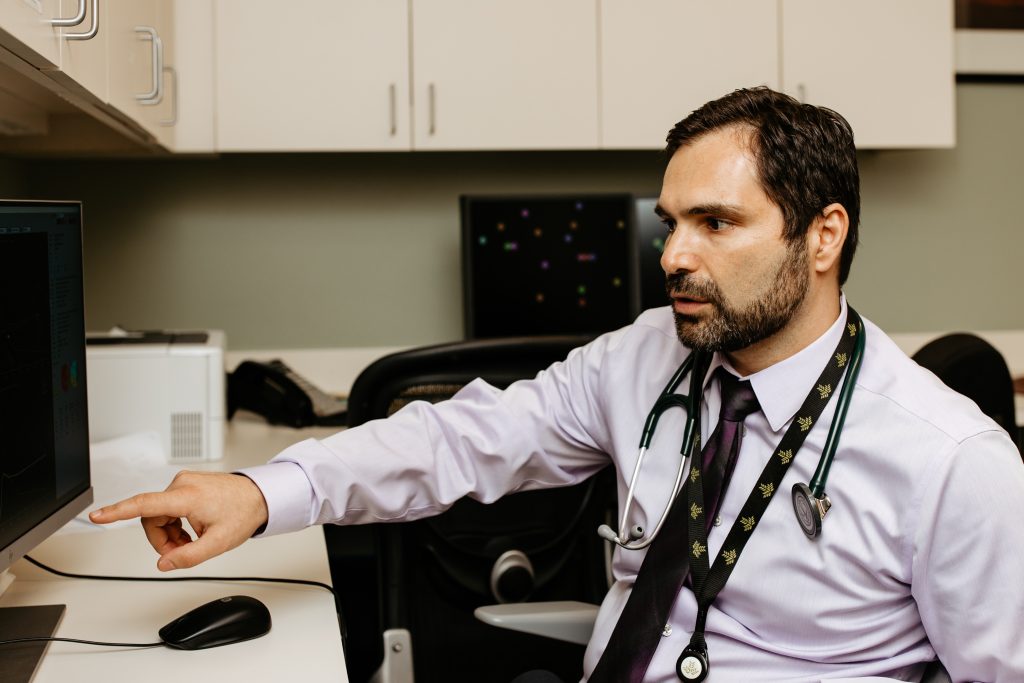An echocardiogram, also known as an echo or as a cardiac ultrasound, uses sound waves from an ultrasound to create images of the heart. The cardiologists at Georgia Heart Institute will use an echo to assess how well all the parts of the heart, including the chambers and the valves, are functioning to pump blood.
An echo is one of most common types of imaging services provided because of its versatility and its ability to provide highly-detailed information.
Why would I need an echocardiogram?
Your cardiologist may suggest an echo to evaluate the overall functioning of your heart, as well as detect heart disease. Specifically, an echo can help to diagnose and monitor conditions that impact the heart valves (valvular stenosis, valvular insufficiency) or the heart chambers (myocardial disease, pericardial disease and more).
An echo may also be used as part of an ongoing treatment plan. It may be used to track how a disease progresses over time or it may be used after a procedure to ensure its effectiveness.
FAQs about Echocardiograms
We offer several different types of echocardiograms, the most common being transthoracic and transesophageal. In most cases, an echo will take less than an hour, but in some cases it may be longer.
A transthoracic echo is the standard type used. You’ll experience the following with this type of echo:
- One of our technologists or a sonographer will place a transducer (part of the ultrasound machine) on your chest.
- The transducer picks up echoes from the sound waves your heart produces each time it moves.
- These echoes are then converted into images on the screen.
- Enhancing agents may be used through an IV line if imaging is unsuccessful or unclear.
If greater detail is needed, a Transesophageal echo may be used. You’ll experience the following with this type of echo:
- One of our team members will use a numbing agent on your throat and additional medications will be used to help you relax during the procedure.
- The transducer will be placed in a flexible tube and guided into your esophagus.
- The transducer picks up echoes from the sound waves your heart produces each time it moves – these echoes are unobstructed and clear.
- These echoes are then converted into highly-detailed images on the screen.
An echo has very minimal risks or side effects, if any at all. With a transthoracic echo there are no risk factors.
With a transesophageal echo, there are a few minor risks, including throat discomfort, or in rare cases, your throat may be scraped. It is also possible for medications used during the procedure to cause unwanted symptoms, but you will be monitored throughout the procedure to prevent this.
For a transthoracic echo, there should be no lingering side effects. Beyond some mild pressure while the transducer is on your chest, there should be no other symptoms.
With a transesophageal echo, you may experience some mild throat discomfort. You may also feel somewhat tired or lethargic after the procedure due to sedative medications, but that will quickly wear off.

Why Choose Georgia Heart Institute for Your Echo?
As Georgia’s leader in heart care, all diagnostic services at Georgia Heart Institute are provided by our expansive and highly-trained team of certified technologists and our board-certified non-invasive cardiologists. These experts specialize in the early detection of all conditions on the heart disease spectrum. Before patients receive any diagnostic services, our team will consider a variety of factors to determine the most effective imaging and testing option.
Request an Appointment
Cardiologists at each of our locations can refer you for one of these imaging procedures or determine which test or diagnostic would be best to help determine your cardiac treatment plan.
If you are concerned about your heart health and you feel you need testing, please book an appointment with one of our cardiologists. If you already have a referral for an echocardiogram and need to schedule, please call us at 770-219-7666 (option 1).

